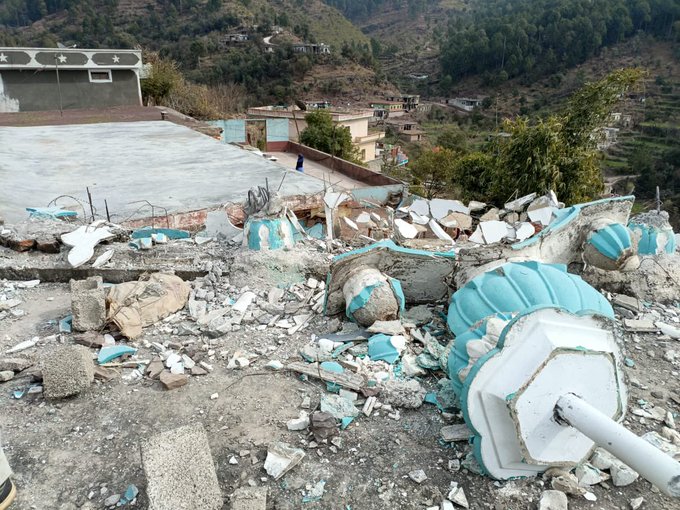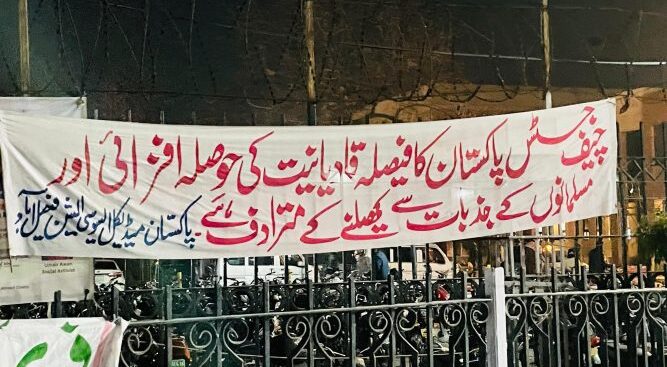In 2024, the Ahmadiyya Muslim Community in Pakistan is facing an unimaginable surge in violence and systematic persecution, casting a dark shadow over their lives and freedoms. The year has been marked by a harrowing series of events that reveal the depth of the hatred and intolerance directed at this peaceful community. The sheer brutality of the situation is beyond words—men, women, and even children are living in constant fear, with their very existence threatened by those who seek to erase their presence from society.
As of July 2024, four Ahmadi Muslims have already lost their lives in the most horrific ways, targeted solely because of their faith. Among them was Tahir Iqbal, the respected president of the local Ahmadiyya Muslim Community in Bahawalpur. His life was cruelly cut short in March when motorcyclists ruthlessly gunned him down. Just a few months later, in June, a 16-year-old madrassa student took the lives of two more innocent Ahmadis, Ghulam Sarwar and Rahat Ahmad Bajwa, in separate, cold-blooded incidents in Mandi Bahauddin. The motive? Religious hatred. The bloodshed did not stop there. In July, Zaka ur Rehman, a 53-year-old dentist, was murdered in his clinic in Lala Musa, Gujrat, by an assailant driven by the same blind hatred. These heinous crimes are not just attacks on individuals; they are assaults on an entire community, leaving the Ahmadis to navigate a life where they are constantly looking over their shoulders, with no justice in sight.
But the persecution doesn’t end with the loss of life. The Ahmadiyya Muslim Community’s places of worship, their sacred mosques, and even the graves of their loved ones have been subjected to desecration. In February 2024, extremists, armed and filled with hatred, descended on an Ahmadi mosque in Kotli, Azad Jammu, and Kashmir. They smashed the minarets, symbols of their faith, and mercilessly beat those who were there to worship in peace. The attacks on their mosques continued into June, with a mob of 150 people laying siege to another Ahmadi mosque in Kotli during the holy celebration of Eid. But the cruelty didn’t stop there—across Pakistan, more than 30 Ahmadis were arrested for the simple act of celebrating Eid, among them a mere 13-year-old boy. How can a society stand by while a child is imprisoned for rejoicing in a religious festival?
This narrative of suffering, pain, and relentless persecution is a heartbreaking reminder of the extreme vulnerability of the Ahmadiyya Muslim Community in Pakistan. They are targeted, attacked, and denied their most basic human rights, with little hope for protection or justice. The world must not turn a blind eye to this ongoing tragedy—these stories need to be heard, these lives remembered, and this community defended from the forces of hatred that seek to silence them.
The violence inflicted upon Ahmadi Muslim mosques is not the only assault on their dignity; the state-sanctioned desecration of their graves adds a profound layer of cruelty to their suffering. In January 2024, the Punjab police, acting on the orders of a local official infamous for his persecution of Ahmadis, desecrated 65 tombstones in Musay Wala. These tombstones, once symbols of peace and remembrance, were shattered under the weight of intolerance and hatred. Such acts of desecration do more than defile sacred spaces—they send a terrifying message to the Ahmadiyya Muslim Community that their very existence is unwelcome, even in death. It is a stark reminder that their faith, their history, and their lives are under siege.
But the assault on the Ahmadiyya Community doesn’t stop at physical violence; it extends into the very fabric of their civil rights. For nearly four decades, since 1985, the Ahmadis have been stripped of their right to vote in Pakistan unless they renounce their Islamic faith—a demand that is both heart-wrenching and impossible for a devout community. Placed on a separate non-Muslim electoral register, they face the unbearable choice of abandoning their identity or being silenced at the polls. This legal discrimination has systematically disenfranchised an entire community, making them invisible in the political landscape of a country they call home. Even in the elections earlier this year, the Ahmadis remained voiceless, further entrenching their isolation and the suffocation of their religious freedoms.

The persecution reached a new, devastating peak in August 2024, following the ruling in the Mubarak Ahmad Sani case. Mr. Sani, an Ahmadi Muslim, had been charged under the draconian Punjab Holy Quran (Printing and Recording) (Amendment) Act of 2021 for distributing a copy of the Tafseer-e-Sagheer (Holy Quran with commentary) to Ahmadi students back in 2019. For over two years, he languished under this baseless charge, his life hanging in the balance. But in February 2024, there was a glimmer of hope when Chief Justice Qazi Faez Isa’s bench ordered his release, recognizing that the alleged offense occurred before the law was amended, and thus could not be applied retrospectively. Yet, this ruling, while just, highlighted the relentless scrutiny and persecution the Ahmadiyya Community endures—a persecution that continues unabated, with the constant fear that any expression of their faith could be met with harsh punishment or worse.
The plight of the Ahmadis in Pakistan is a deeply tragic story of faith under fire. Their mosques, their graves, their rights, and their very lives are under relentless attack. This community, which seeks only to live in peace and practice their faith, faces a world where their existence is constantly threatened, and their voices are systematically silenced. The world must recognize and respond to this injustice, for the silence of inaction only deepens their suffering and further endangers their future.
The Supreme Court’s ruling to release Mubarak Ahmad Sani, rejecting calls for further blasphemy charges due to the lack of evidence, initially offered a glimmer of hope for justice. But what followed was a devastating backlash that shook the foundations of justice and security in Pakistan. Extremist groups, particularly Tehreek-e-Labbaik Pakistan (TLP), erupted in fury, launching widespread protests and a vicious hate campaign not only against the Ahmadiyya Community but also against Chief Justice Qazi Faez Isa, whose courage in upholding the rule of law suddenly made him a target.
The situation spiraled into even darker territory in July when the Supreme Court, after a review of its own decision, stood firm in its ruling to release Mr. Sani. While reiterating that the constitutional status of Ahmadis remained unchanged, the court affirmed their right to practice their faith in private—a small but significant recognition of their humanity. But instead of bringing peace, this decision ignited even more intense protests and hostility, culminating in the issuance of a bounty on Chief Justice Isa’s head by TLP leaders. The message was clear: even the highest court in the land was not safe from the wrath of those who refuse to tolerate dissent or difference.
Under immense pressure from extremists and the Punjab Government, the Supreme Court was forced into an unprecedented “clarification hearing,” where it faced relentless demands to overturn its decision—demands that went beyond the scope of the law. In a shocking and alarming turn of events, the earlier verdict was amended, and a notice was issued to remove the sections that had recognized the Ahmadis’ right to practice their faith in private. This was not just a reversal; it was a capitulation to violence, a terrifying precedent that signals to all of Pakistan that judicial decisions can be undone by the threats of extremists.
This is more than just a legal setback; it is a catastrophic blow to justice, freedom, and the very fabric of Pakistani society. The case of Mubarak Ahmad Sani has exposed the dangerous intersection of the judiciary and extremist politics in Pakistan, where the rule of fear subverts the rule of law. It leaves the door wide open for future verdicts to be overturned by violence and intimidation, eroding the independence of the judiciary and endangering the lives and rights of not just the Ahmadiyya Community, but all minorities, and indeed every citizen in Pakistan.
This is an extremely serious and alarming development, one that starkly contrasts with the noble vision of Pakistan’s founder, Mohammad Ali Jinnah, who envisioned a nation where all citizens, regardless of faith, would be treated with respect, dignity, and justice. The recent events betray that vision, threatening to plunge the country into a dark abyss that might trample right, and the voices of the few drown out the cries for justice of the many. This is a moment of profound crisis, not just for the Ahmadis, but for the soul of Pakistan itself.
